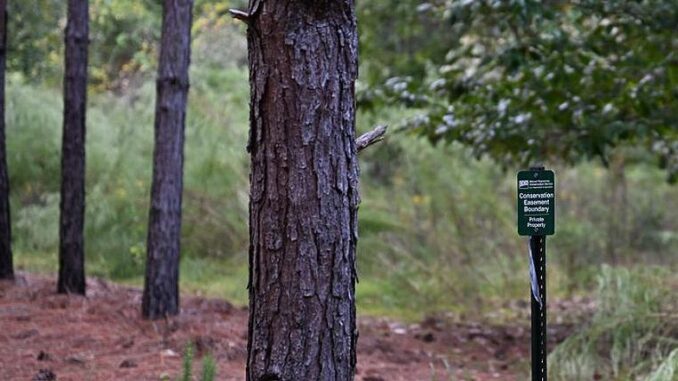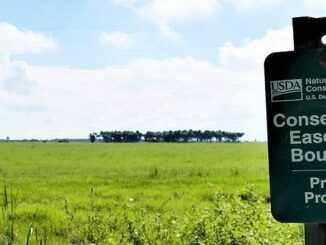
ATLANTA, Georgia, June 14, 2024 (ENS) – The promotion and sale of abusive syndicated conservation easement tax shelters has led to a guilty plea on the part of another Georgia certified public accountant to conspiracy and filing a false personal tax return. To date, 10 defendants: eight Georgia CPAs, an attorney-CPA, another attorney, and an appraiser, have been convicted of participating in the conspiracy.
Today Herbert Lewis, a CPA and tax return preparer at an Atlanta-based accounting firm, pled guilty to selling tax deductions to his wealthy clients in the form of units in illegal syndicated conservation easement tax shelters, according to court documents and statements made in court.
Beginning in 2014 and through at least 2019, Lewis promoted and sold these tax deductions claimed for the illegal syndicated conservation easements organized and created by Lewis’ co-defendants.
In 2019, Lewis assisted 15 clients with claiming false deductions on their 2018 returns. In total, Lewis assisted in the preparation of tax returns that claimed nearly $14 million in false deductions based on backdated documents, causing a tax loss to the IRS of nearly $5 million.
Lewis earned over $1 million in commissions for his role in promoting and selling the illegal tax shelters to clients. Lewis concealed the amount of commissions he had earned from selling units in these shelters by not fully reporting the commissions on his personal returns and instead fraudulently reporting commission income he had earned as income on the tax returns of nominee entities in his children’s names.
For their involvement in the scheme, CPA Jack Fisher and attorney James Sinnott were sentenced in January to 25 and 23 years in prison, respectively.
Judge Timothy Batten, chief U.S. District Judge for the Northern District of Georgia, handed down the lengthy sentences in the first criminal trial related to syndicated conservation easements. CPA Jack Fisher was sentenced to 25 years, and attorney James Sinnott was sentenced to 23 years in prison for organizing syndicated conservation easement deals that resulted in over $1.3 billion in allegedly fraudulent charitable tax deductions obtained from 2004–2019.
According to the indictment, the conspiracy involved the creation of partnerships that would purchase land and land-owning companies and then donate conservation easements over that land or the land itself.
Appraisers would allegedly generate fraudulent and inflated appraisals of the conservation easements that often valued the easements at amounts at least 10 times higher than the price actually paid by the partnership for the land or land-owning company, just months before the appraisals.
As charged, the partnerships claimed a charitable contribution tax deduction based on the inflated value of the conservation easement, resulting in a fraudulent tax deduction flowing to the clients who purchased units in the partnership.
Court documents and statements made in court show Lewis knew that, against the law, the transactions related to these illegal tax shelters lacked economic substance; that his wealthy clients participated only to obtain a tax deduction and that his clients received only a tax benefit for their participation in the shelters.
For instance, a client who purchased units in a partnership had a “vote” on what to do with the land the partnership owned. Yet Lewis knew that the “vote” held by the partnership each year was just for optics and that the land would be donated as a conservation easement.
In some cases, to make it appear that his clients had joined the partnerships before the date of the conservation easement donation, which was necessary to claim the tax benefits, Lewis instructed and caused his clients to falsely backdate documents, such as subscription agreements and checks, related to the partnerships.
Lewis is scheduled to be sentenced by a federal district court judge on October 16 and faces a maximum penalty of five years in prison for the conspiracy charge and three years in prison for the charge of filing false tax returns. Lewis also faces a period of supervised release, restitution and monetary penalties.
To date, in addition to the convictions of Fisher and Sinnott, eight additional defendants have pleaded guilty to criminal conduct related to the syndicated conservation easement tax shelter scheme, including: appraiser Walter Douglas “Terry” Roberts, CPAs Stein Agee and Corey Agee, CPA Ralph Anderson, CPA James Benkoil, CPA Victor Smith, CPA William Tomasello and CPA and attorney Randall Lenz.
IRS Criminal Investigation and the U.S. Postal Inspection Service investigated the case.
Polsinelli, one of the 100 largest law firms in the United States, advises on its website that, “Professional advisors and their clients should be aware of the potential risk associated with similarly structured transactions for tax years 2023 and 2024.”
Congressional action in December 2022 ended syndicated conservation easements, SCEs, like those organized by Fisher but left the door open for syndicated fee simple land donations that use the same strategies at issue in the Fisher trial, Polsinelli advises. “Fee-simple donations and donations of conservation easements are commendable and serve a noble public good, and the IRS and DOJ believe they are targeting those who have abused those sections.”
“Although there is no safe harbor,” Polsinelli warns that “investors and the professionals who advise on them need to deeply consider the increased enforcement risk and transaction costs associated with any syndicated fee simple donation that generates over $2.50 in deductions for every $1 invested. The IRS and DOJ view these deals with a high degree of skepticism, and this has translated into aggressive enforcement that will increase the cost of the deal and risk, even years after the donation and subsequent economic benefit.”
Featured image: A legal conservation easement in Georgia. 2023 (Photo courtesy Natural Resources Conservation Service, U.S. Department of Agriculture)
© 2024, Environment News Service. All rights reserved. Content may be quoted only with proper attribution and a direct link to the original article. Full reproduction is prohibited.



